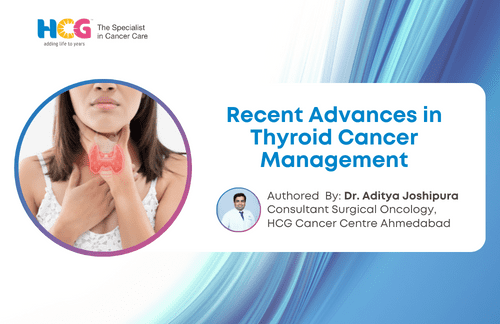
30 May, 2025

30 May, 2025
Thyroid cancer is becoming more common globally, although it is particularly prevalent in developed nations. In recent times, thyroid cancer cases have been rising quickly in our country as well.
According to our research, younger people are developing thyroid cancer at an increasing rate. In the light of thyroid cancer’s rising prevalence, it is well understood among the healthcare community that newer diagnostic and treatment approaches are necessary for the successful management of this condition.
At HCG Cancer Centre, Ahmedabad, we have a dedicated unit for thyroid cancer management. This team comprises cancer specialists who have extensive training in advanced surgical and other treatment approaches for thyroid cancer. Our exclusive thyroid care team employs highly advanced diagnostic, treatment, and monitoring approaches in order to deliver the best treatment and care to all thyroid cancer patients.
Thyroid cancer is a very slow-growing cancer. Fortunately, it is also one of the highly treatable cancers. In about 95% of the cases, thyroid cancer is localised, and therefore, surgery is the primary line of treatment for this condition.
Thyroid cancer surgeries often involve the removal of a part of the thyroid gland (partial thyroidectomy) or the entire gland (total thyroidectomy). We perform both open and minimally invasive surgeries to treat thyroid cancer.
Precision is one of the most crucial factors to consider when performing thyroid surgery. The lack of precision may permanently damage crucial nerves close to the gland. Keeping this in mind, our team at HCG develops individualised treatment strategies for thyroid cancer cases to enhance the overall precision and efficacy of the treatment.
Robotic thyroid surgery is recommended for selective patients based on the stage of the disease, their overall health status, and their preferences. The surgeon performs robotic thyroid surgery with the help of controlled robotic arms. This procedure is scarless and does not hamper the patient’s facial appearance. The high-precision levels of robotic thyroid surgery benefit the patient with multiple advantages like reduced blood loss and pain, reduced hospital stay, fewer treatment-related complications, and faster recovery.
The recurrent laryngeal nerve (RLN) is susceptible to damage during thyroidectomy. Damage to RLN can result in hoarseness, loss of voice, and difficulty in swallowing or breathing. IONM enhances the precision of thyroid cancer surgeries by carefully monitoring recurrent laryngeal nerve during the treatment and helping the surgeons in ensuring that its structure and functions are not hampered.
Those patients undergoing IONM during their surgery have a reduced risk of nerve damage, and their voice parameters are completely normal.
HCG Cancer Centre, Ahmedabad, is the first centre in Western India to have an Intraoperative Neuromonitoring (IONM) facility to enable high-precision thyroid cancer surgery solutions. We have treated over 275+ thyroid cancer cases with superior precision using IONM.
The thyroid care team at HCG Cancer Hospital closely works with speech therapists, who are trained to help thyroid cancer patients experiencing speech and swallowing problems after surgery. They help patients recover with the help of appropriate exercises that can help them recuperate better and regain their ability to speak and swallow.
Apart from surgery, there are some non-invasive treatment options available for thyroid cancer. Throughout the course of these treatments, patients will be able to carry on with their routine activities. Also, due to enhanced precision and accuracy, these treatments come with fewer treatment-related complications.
Radioiodine therapy involves the usage of radioactive iodine molecules to destroy the abnormally-dividing thyroid cancer cells. This treatment is extremely safe and effective, and patients will have an excellent quality of life post-treatment. Radioiodine therapy can be used to treat advanced-stage thyroid cancers as well.
In recent times, we have come across some novel immunotherapy and targeted therapy molecules. Immunotherapy molecules work by stimulating the patient’s immune system to identify and attack cancer cells. Targeted therapy works by targeting the specific proteins and genes present on the surface of the cancer cells and stopping them from multiplying further or killing them.
Treatment planning is an important step in thyroid cancer management. At HCG, we do preoperative imaging (CT scans, MRI scans, etc.) before surgery in order to locate the tumour precisely and plan the treatment as required.
Treatment monitoring, or response monitoring, is an important step of thyroid cancer treatment. During and after the treatment, certain tests are carried out to check if the patient is responding well to the treatment. Previously, advanced scans like MRI or CT scans were done to monitor the treatment response, and this became an unnecessary financial burden for patients. However, lately, we have identified a tumour marker called thyroglobulin. A simple blood test can help determine the levels of thyroglobulin, which can help specialists understand if the treatment is working well or needs to be altered.
Like every other speciality, thyroid cancer treatment has made great strides. Despite its rising prevalence, we can properly manage this condition - thanks to a variety of cutting-edge treatment strategies. At HCG, we use these cutting-edge treatment strategies to create personalised treatment plans for patients that will promote their faster recovery and improve their quality of life.